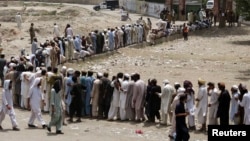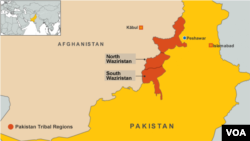Pakistan's military claims to have killed more than 330 suspected terrorists in its ongoing counter-militancy air and artillery offensive in the North Waziristan district on the Afghan border. However, the army action that began nearly two weeks ago has forced nearly half-a-million people, mostly women and children, to flee to safety. The humanitarian crisis is likely to grow as Pakistani ground troops are readying to take part in the action.
A military spokesman says the anti-militancy strikes in the Waziristan region are hitting “all groups of terrorists without any discrimination.” He told reporters Thursday that ground troops will not be involved in the action until all civilians are evacuated from the conflict zone. The spokesman added that special announcements are being made to encourage the population to leave the area as soon as possible.
Meanwhile, thousands of displaced people with their belongings piled high on buses, tractors and donkey carts continue to pour out of North Waziristan. Most are ending up in host communities or renting houses around the nearby town of Bannu. So far only a few hundred have taken shelter in government set-up relief camps.
Lola Castro, head of the World Food Program in Pakistan, says the agency is rapidly scaling up food distribution for the displaced people. She tells VOA her organization, with the help of local authorities and civil society groups, has already provided urgent food rations to more than 4,500 families to meet their needs for the next two weeks.
“We are talking about 455,000 new people which mostly are women and children in fact and it is important the humanitarian community continues being able to access the areas so that we can all do their job and not to disturb the livelihoods of the people and they can settle well,” she said.
The United States on Thursday announced it has contributed an additional $8 million to help Pakistan's government meet the food and nutritional needs of the internally displaced people from the Federally Administered Tribal Areas.
Maryam Bibi’s charity group Khwendo Kor, (which means "Sister's Home" in Pashto) is among the first few organizations that began assisting official relief efforts in Bannu. Bibi says the displaced people, women and children in particular, are facing extremely tough conditions as they move out of Waziristan.
“What I saw, for 40, 50 kilometers, barefooted women and children had come down and they showed me their feet, which were all wounded and swollen. Pregnant women also had to walk all that [distance]," she said. "So, it is really a very, very heartbreaking situation when you look at women and children, elderly and sick.”
Bibi says though authorities are ensuring food and cash are given to the displaced, meeting their long-term needs seems to be a daunting challenge.
“It is a massive humanitarian crisis and I think because the realization is not there, the preparedness is not there and also at the same time you know a strategy is not in place," she said. "So, I think the situation will exacerbate if on emergency basis, on urgent basis, action is not taken.”
The militant-stronghold North Waziristan tribal region is also considered one of the world’s last reservoirs of polio virus. Pakistani authorities, with the help of the World Health Organization, are taking advantage of the civilian exodus to immunize tens of thousands of children and adults against the crippling disease to try to prevent it from spreading throughout Pakistan.
Federal Minister Abdul Qadir Baloch, who is supervising the relief operations, says, “We have made sure that every individual coming out of that place is given the polio drops and we will follow it up wherever they are and they will be given the next dose.”
The militants have not allowed authorities to conduct polio vaccination campaigns in the tribal area, leading to outbreaks of the virus. Out of more than 80 cases in Pakistan this year, 53 were recorded in North Waziristan.





